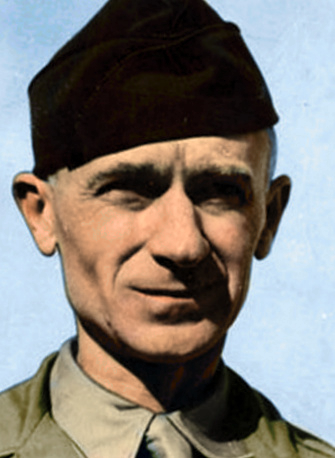The Pittsburgh Press (July 1, 1944)

Roving Reporter
By Ernie Pyle
In Normandy, France – (by wireless)
American anti-aircraft gunners began playing their important part in the Battle of Normandy right on D-Day and shortly after H-Hour.
Ordinarily you wouldn’t think of the anti-aircraft coming ashore with the infantry, but a little bit of everything came ashore on that memorable day – from riflemen to press censors, from combat engineers to chaplains – and everybody had a hand in it.’
The ack-ack was given a place in the very early waves because the general in command felt that the Germans would throw what air strength they had onto the beaches that day and he wanted his men there to repel it.
As it turned out, the Germans didn’t use their planes at all, and the ack-ack wasn’t needed to protect the landings from air attack. So, like many other units, they turned themselves into infantry or artillery and helped win the battle of the beaches.
They took infantry-like casualties, too. One unit lost half of its men and guns.
When I started rounding up material for this ack-ack series I ran onto the story of one crew of ack-ackers who had knocked out a German 88 deeply encased in a thick concrete emplacement – and did it with a tiny 37mm gun, which is somewhat akin to David slaying Goliath.
So, I hunted up this crew to see how they did it. By that time, they had moved several miles inland. I found them at the edge of a small open field far out in the country.
Their guns had been dug into the ground. Two men sat constantly in their bucket seats behind the gun, keeping watch on the sky even in the daytime. The others slept in their pup tents under the bushes, or just loafed around and brewed an occasional cup of coffee.
The commander of this gun is Sgt. Hyman Haas of Brooklyn. Sgt. Haas is an enthusiastic and flattering young man who was practically besides himself with delight when I showed up at their remote position, for he had read this column back in New York but hadn’t supposed our trails would ever cross in an army this big. When I told him I wanted to write a little about his crew, he beamed and said, “Oh boy! Wait till Flatbush Avenue hears about this!”
Their story is this…
They came ashore behind the first wave of infantry. A narrow valley leading away from the beach at that point was blocked by the German 88, which stopped everything in front of it. So driver Bill Hendrix from Shreveport, Louisiana, turned their halftrack around and drove the front end back into the water so the gun would be pointing in the right direction.
Then the boys poured 23 rounds into the pillbox. Some of their shells hit the small gun slit and went inside. At the end of their firing, what Germans were left came out with their hands up.
The boys were very proud of their achievement, but I was kind of amused at their modesty. One of them said, “The credit should go to Lt. Gibbs, because he gave us the order to fire.”
The lieutenant is Wallace Gibbs of RFD 2, Charlotte, North Caroline. The other members of the crew are Cpl. John Jourdain of New Orleans; Pvt. Frank Bartolomeo of Uledi, Pennsylvania; Pvt. Joseph Sharpe of Clover, South Carolina; Pfc. Frank Furey of Brooklyn; Cpl. Austin Laurent Jr. of New Orleans, and Pvt., Raymond Bullock of Coello, Illinois.
Their gun is named “BLIP,” which represents the first letters of Brooklyn, Louisiana, Illinois and Pennsylvania, where most of the crew come from.
Our ack-ack on the Normandy beachhead can be divided into three categories. First are the machine guns, both .50-caliber and 20mm. Airplanes have to be fairly low for these to be effective.
The ack-ack branch has thousands of such guns, and so does every other fighting unit. When a low-flying strafer comes in, everybody who has anything bigger than a rifle shoots at him, whether he is an ack-ack man or not.
The second big category of ack-ack is the Bofors, a 40mm long-barreled gun which can fire rapidly and with great accuracy at medium altitudes.
Our ack-ack is equipped with thousands of these, and although they can’t see their targets at night, they put a lot of shells into the sky anyhow.
The big gun, and the elite, of our ack-ack is the 90mm. This is for high-altitude shooting. It is the gun which keeps most of the planes away, and which has such a high score of planes shot down. I spent two days and nights with one of these crews, and in the next two or three days I will try to tell you what life is like for them.
